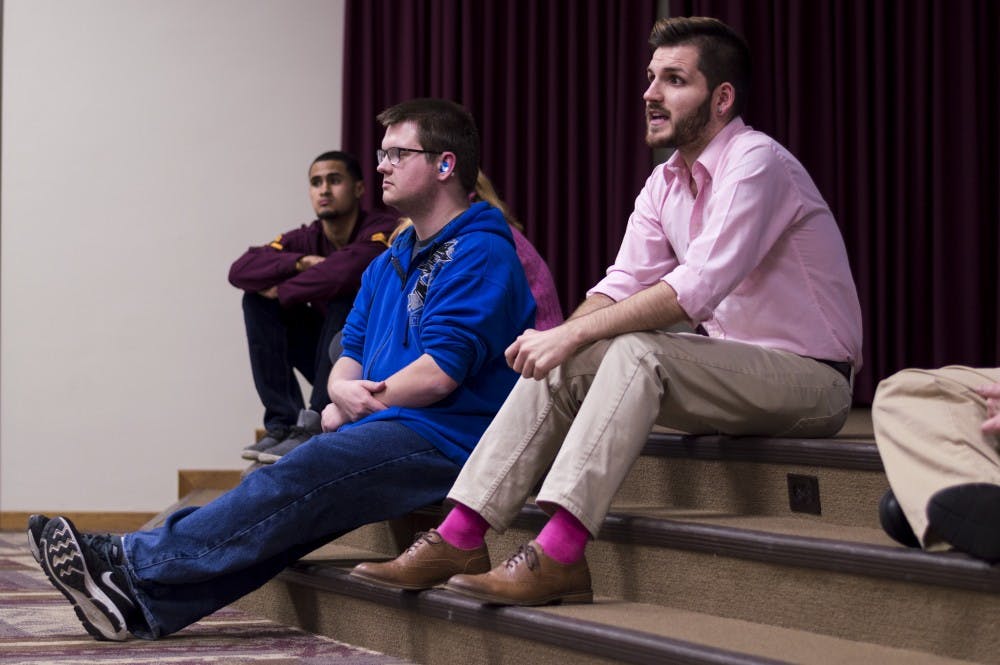Organization of Women Leaders holds panel on toxic behaviors

The Organization of Women Leaders (OWLs) was planning to hold a panel that discussed toxic masculinity at 7 p.m. Dec. 6 in the Bovee University Center Auditorium. Its topic changed when Dexter senior Francesca Farzalo decided to focus the discussion on toxic behavior instead.
“I changed the title at the last minute because I had it saying conversations on toxic masculinity when I think maybe the more important conversation we should be having is conversations on toxic behavior, Farzalo said. "Toxic masculinity affects all of us, but when people see the word masculinity they think it only applies to men, which is not true. Women perpetuate toxic behaviors, men perpetuate toxic behaviors."
When the panel began, Farzalo let the members in the audience know that the goal of the night was to be relaxed. She wanted it to be an open dialogue that allowed the audience members to get involved.
Farzalo proceeded to show the audience a Youtube video, "Mr. Rogers -- It’s You I Like," showing Mr. Rogers talking to a young boy in a wheelchair. As the video played, the audience saw the young boy discuss why he was in a wheelchair and this eventually led to Mr. Rogers singing a song about how much he liked the young boy for being himself.
The definition of toxic masculinity was introduced after the video. It covered how masculinity can be seen as something defined by violence, sex, status, and aggression. The panel addressed how toxic masculinity is something that impacts everyone in society and restricts men from expressing their emotions.
The panel consisted of various students and faculty member Edward Clayton. Panelists discussed their opinions on different questions asked throughout the night. For some students, being gay and being an athlete were key talking points when opening up about how toxic masculinity has affected them throughout their lives.
Baldwin senior Brandon Childress, who is a CMU athlete, let the audience know his feelings towards how men are seen in society. His current viewpoint on masculinity was developed after taking a gender communication class.
“I realized that for so long I had this traditional view of what it means to be a man and I looked at myself and said ‘I really don’t fit the traditional (idea) that people say a man should be,’" Childress said. "I’m very passionate and wear my emotions on my sleeve so I’m not like most men that can hide it. For a long time I thought that I had to change and be what society was telling me what I had to be, but then I learned there’s nothing wrong with the way I am."
From there, conversation continued as the panel moved through topics. Topics included brief discussion on how masculinity factors into relationships, feminism and consent.
Discussion on consent stirred a few responses from the audience as those who spoke agreed on the lack of sex-comprehensive education many people face.
“The whole consent thing, I was thinking in the audience the entire time, 'I don’t really remember in sex-ed talking about consent,'" Northville senior Natalie Weist said. "I think it’s kind of sad that I never learned it formally from someone else."
Farzalo said the main reason she organized the panel is because she wanted to break down the subconscious conditioning people are raised with to believe certain things about their identities.
For Farzalo, she believes in order to break traditional ideas of gender, people must start by finding it in themselves.
“If there is ever going to be a point where we destroy traditional concepts of gender, we have to start with ourselves and we have to really liberate our own conceptions of those kinds of things because they are so influenced by our society and our culture,” Farzalo said.



